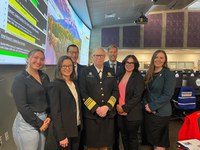U.S. Assistant Secretary of Health Explores City of ABQ’s Heat Mitigation Efforts
May 26, 2022
Today, City officials were joined by the U.S. Assistant Secretary for Health, Admiral Rachel Levine, MD, who visited Albuquerque to highlight the stories of cities experiencing the impacts of climate change and resulting public health implications for frontline communities. While in Albuquerque, Admiral Levine learned about Albuquerque’s work to mitigate rising urban heat, it’s disproportionate impacts on vulnerable residents, and how federal, community, and local partners can work to create change.
Albuquerque’s frontline communities, located in the hottest urban heat island areas, are most at risk to the negative health impacts of heat, as documented in the City’s 2021 Heat Watch Campaign report.
“This data is so important in showing how heat impacts neighborhoods in different ways throughout the city,” said Sustainability Officer, Kelsey Rader. “Strategically increasing shade and tree canopy can go a long way in protecting residents from dangerous summer temperatures while providing health and environmental benefits.”
“Utilizing multiple data sources is critical to implementing data-driven management decisions and proper stewarding of the city’s urban tree canopy,” said Sean O’Neill, the City’s Assistant Forrester “Maintaining and increasing this vital urban natural resource will take everyone in our city coming together to create a greener and cooler community for us all.”
Admiral Levine learned about local heat mitigation initiatives during a multi-site tour that started at the City of Albuquerque’s Emergency Operations Center, followed by Tingley Beach in the Bosque, Wilson Middle School’s community garden project, and the Rio Grande Valley State Park.
These locations showcase green spaces, community gardens, and heat mitigation projects. The City of Albuquerque also announced a new collaboration with NASA’s DEVELOP program to further develop heat-related modeling to assist in strategic tree canopy development, to take place this summer. DEVELOP addresses environmental and public policy issues through interdisciplinary research projects that apply NASA Earth observations.
“Cases of heat exhaustion and heat stroke in New Mexico are becoming more common as the average number of extreme heat days increases,” said Heidi Krapfl, Deputy Division Director of Programs for the Epidemiology and Response Division at NMDOH. “We must advance climate adaptation and resilience efforts to reduce or prevent impacts on public health, especially for the most vulnerable.”
“The effects of climate change on our community are already here; we can see it in the ozone and air quality alerts that make us take our kids inside, in the historic catastrophic fires raging up north, and in the heat islands in our lowest income neighborhoods,” said Mayor Tim Keller. “We are thankful to Admiral Levine for taking time to learn about our local efforts. We stand ready to help scale these climate resilience and adaptation strategies to protect residents in cities across the nation.”
The new data modeling project builds on the Keller administration’s substantial work to date on sustainability, including:
- Now utilizing 88% renewable energy for municipal operations with the completion of the Solar Direct project,
- Won a $2.7 million federal grant to bring the first electric buses to Albuquerque,
- Signed the Paris Agreement, after President Trump pulled out, committing the city to climate action,
- Installed 38 solar projects at city-owned buildings,
- Ranked as 4th highest large U.S. City for most solar installed per capita by Environment America’s Shining Cities 2022 Report,
- Launched the Mayor’s Energy Challenge to support local businesses reduce energy use,
- Won Bloomberg American Cities Climate Challenge with funding for sustainability efforts,
- Made the transition to more sustainable LED street lights citywide,
- Provided over 200 homes with free energy audits and upgrades in partnership with PNM, Partnership for Community Action and Prosperity Works,
- Purchased the first electric vehicles for the City fleet, and enacted a “Zero Emissions First” fleet vehicle adoption policy,
- Achieved LEED for Cities Silver certification,
- Ranked 31st out of over 100 U.S. Cities for overall sustainability on the 2021 City Clean Energy Scorecard by the American Council for an Energy-Efficient Economy (ACEEE),
- Installed 20 electric charging stations with 36 charging ports across City facilities
- Launched the 2021 Climate Action Plan.

